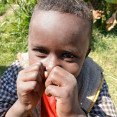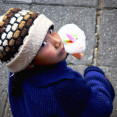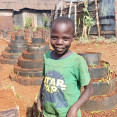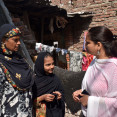
During a recent trip to Bolivia, Gerry Walker, Toybox’s Marketing and Content Manager had the opportunity to see firsthand some of the child rights work that’s underway in the cities of La Paz and El Alto, giving children and young people in street situations a voice. Here she shares her reflections.
At Toybox, a key aspect of our work focuses on educating children, care givers and communities about Child Rights and protection and addressing the disparities in realising these rights. Not only is this work essential to fostering safe environments where children can thrive, it also helps prevent abuse and strengthen communities. It’s an area of our work that I was less familiar with, so when the agenda for my trip to Bolivia was finalised, I was delighted to be able to see some of this work in action.
CREATING A VISION FOR THE FUTURE
It was during my last day in La Paz that we made a visit to The Ombudsman's Office of Bolivia (the equivalent to our Commission of Equality and Human Rights), to watch a performance by children and young people involved in the “I count too” Network. Speaking with the Lizeth, who works for our local partner Alalay and is this project’s lead, she explained;
“The ‘Yo Tambien Cuento’ (‘I count too’) Network is made up of children, adolescents and young people aged 7 to 25 who are part of Alalay's Street, Protection and Prevention Programmes. It’s a space where the voices of children and adolescents are heard - a place where they can make proposals so that the laws of the country are enforced. Through the network, children and adolescents have the opportunity to develop a vision of the future, to contribute towards building an empathetic and caring society, framed by respect for their rights and the exercise of their rights.”
I heard how the children and young people involved in the Network normally meet once a week in two different shifts, scheduled according to their school attendance times. As part of the programme, the children and young people attend workshops to learn about their rights. They also participate in meetings with the authorities, as well as the local council’s Child and Adolescent committees in El Alto and La Paz. As a group they also develop public policy proposals.
The project is a great example of children using their "Right to Participation", - a right which is included in the UN Convention on the Rights of the Child (a legally binding international agreement setting out the rights of every child). Not only do they have the opportunity to learn about child rights, they have also successfully influenced local government.


AN OPPORTUNITY TO EXPRESS THEIR RIGHTS
Lizeth shared, “The leadership and participation workshops strengthen the social and cognitive skills of children living on the streets. Leaders have more opportunities to explore their imagination. In turn this supports them to function better in social settings and to share what they have learnt with their peers, as they are knowledgeable about their rights.”
Lizeth explained how the theatre production we’d come to watch was an opportunity for the children and young people to express their right to things such as health, education, identity, protection and a life free from violence. The production also provided the opportunity to shine a light on how some rights were currently being violated - although the authorities are aware of the policies, they were not always complying with them. For example, some policies can be quite vague ("ensure all children have access to education") - it's not a deliberate exclusion of children in street situations, but sometimes a lack of awareness (and budget) to have specific projects dedicated to ensuring they are included.
I was amazed to hear that the children had taken the lead in deciding both the format and content for the event. Lizeth shared how the children had been planning the activity for around three months and had chosen theatre as the medium in which they wanted to deliver their proposals to the Commission. In the final month, the group had been rehearsing with the support of a theatre company twice a week – what dedication! Lizeth shared, “You learn a lot from the children and young people - seeing them grow and develop as leaders. In the project evaluations, many of them drew their dreams or goals for the future - many wanted to go to university. It’s been very emotional for me to see their aspirations and to see that they can identify that there are opportunities in their lives that they themselves are building day by day.”
CELEBRATING RESILIENCE AND CREATIVITY
As I settled back into my seat to watch the performance, I too could feel myself welling up with emotion. Seeing this group of young leaders perform on stage in the auditorium of the Equality and Human Rights Commission was truly remarkable– especially considering the challenging backgrounds and discrimination they have faced throughout their young lives. I recognised some of the children from other project activities I’d seen during my visit and knew that many of them faced significant challenges in their daily lives. But here there were, passionately expressing their ideas in such imaginative and colourful ways. Their beaming smiles radiated a genuine sense of pride and self-worth. I left for the airport with a real sense of hope for the brave and determined children and young people I had the absolute privilege of watching on stage.




